Greetings! ScoreKeeper here barking up a tree to get that damned cat who's run off with the top secret plans for feline global domination. In the mean time, why don't you check out my latest interview with film, television, and video game composer Christopher Lennertz.
I know that CATS AND DOGS: THE REVENGE OF KITTY GALORE (2010) is not your typical table acquisition for the common Ain't It Cool reader unless you have mini-me(s) running around the house begging you to take them. In either case, there are a couple really cool film music related nuggets here worth mining. The film itself sports a smart and amusing score worthy of some attention but more so than the headlining feature is the Looney Tunes computer-animated short that precedes it.
I'm huge fan of Carl Stalling, the grandfather of the "mickeymousing" scoring technique which helped make the Warner Bros. Looney Tunes cartoons so iconic. To hear Lennertz channel Stalling for this updated take on the flaccidly fierce Wiley E. Coyote and his nemesis Road Runner was a real treat. I've been told it was the first of a trio of new shorts which are set to come out. Perhaps more?
Chris is also the composer of many video games including GUN (2005), MEDAL OF HONOR: EUROPEAN ASSAULT (2005), QUANTUM OF SOLACE (2008), and THE SIMPSONS GAME (2007) as well as grinding out episodes of SUPERNATURAL (2005-2010) about to enter its sixth season.
He's a always personable and a joy to talk to. Take a peak if you dare...

ScoreKeeper: Chris, thanks for talking with me today. You’ve been extremely busy this year scoring a variety of different films, but it’s actually something relatively smaller that you’ve done that has piqued my interest propelling me to chat with you.
I’m talking about the computer-animated LOONEY TOONS shorts.
Christopher Lennertz: And they are so much fun! When I first heard about these I absolutely had to do them. I was such a big fan when I was a kid and I remember listening to the music so intently. I was amazed at how awesome the music was even when I was little.
SK: It’s got to be a composer’s dream come true. Carl Stalling is no easy composer to follow in the footsteps of.
CL: (Laughs) No, let me tell you…It’s probably some of the hardest music I’ve had to write in a long time.
SK: I can imagine. There are very few composers in the history of cinema that continually leave me in such a complete state of awe. Carl Stalling is certainly one of those people. Every time I listen to his work, I’m flummoxed.
How did you musically prepare yourself to follow in his footsteps with these new shorts?
CL: First of all, I knew his music well but I really wanted to get as much of a refresher course as I could so I definitely did a lot of research. I listened to a ton of the old stuff. I watched a ton of the old stuff and really got into it and tried to figure out what it was he was doing. One of the things that I thought he was so great with was he would turn on a dime, but it wouldn’t feel out of place. It would feel like it fit perfectly. One of the things I wanted to figure out was “How did he do that? What did he do to make that happen?”
A lot of his music was classically inspired. It was kind of like he would throw Stravinsky and Mozart into a blender and just see what came out of it. It was such a great eye-opening experience to really get back into it knowing that I’m going to have to write something sort of in this style. That’s really what I did and I just listened and listened like crazy. I tried to be pretty tough on myself in terms of realized that this is a franchise that holds a very special place in the hearts of pretty much everybody in America, so no pressure, but I wanted to make sure I didn’t screw it up either. (Laughs)
SK: Can you let me in on some of these Carl Stalling secrets that you found in your research? What were some of these things that allowed him to do what he did?
CL: I can think of one thing he did that was really interesting. He would state some sort of a melodic or motivic statement and then in a very sort of classical leitmotif kind of way...bring it back. He would do a long five or six note horn melody, for example when Coyote thought he was going to win and the thought he was finally going to get the Roadrunner, you would see him and his eyes would bulge out. There’d be this huge sort of Wagnerian melody and then a minute later you would hear the same little motif but it would be twice as fast with little short plucking notes in the pizzicato strings. It was a completely different style and different tempo. He would always bring back these little motifs a couple of times to make it feel like when you listened to the whole piece. It was really a theme and variation kind of thing with maybe four or five different things plus twenty different variations in like two minutes.
Sometimes you would just think “Oh, it’s just little Mickey Mouse stuff here and there,” but when you really listen he would bring back even the slightest little three note motif. It wasn’t out of nowhere. They were always related to something else and I think that’s what kept the music having a form that made some sense, even though it was so schizophrenic.
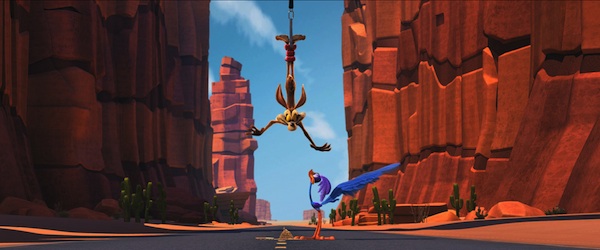
SK: Did you feel like you were channeling somebody else’s style or were you allowed to speak musically in your own style?
CL: I think the interesting thing was I felt like I was doing half-and-half. In one sense I felt I was doing an homage to him and in another sense I felt like...Well, one of the things that they wanted, since they were going 3D and full CGI, is to have the music feel a little grander and a little more modern. Sort of like a blockbuster film without having it sound like it didn’t belong in the world of Wiley E. Coyote and Road Runner.
One of the ways we did that was, first of all we had a slightly bigger orchestra. Then I feel like some of my melodic stuff and some of my action music during the chase scenes became a little more what I would consider modern orchestral action scoring. A lot of the comedy stuff is where I really brought in a Stalling moment. One of the things that worked about that was that I used the same technique where I would take my eight bars of a little bit more of a modern action sequence and then I would still deconstruct that in the same way. I would use the pizzicatos and the woodwinds for the comedy moments so they would have the same relation. That was very much the Stalling approach but utilizing my thematic material.
SK: That makes sense. I could hear that. There are these building ascending ostinatos in there and I remember hearing it and thinking “Okay, that’s not what Stalling would do, that’s a more modern way of approaching the material.”
CL: Yeah, there was a couple of good moments where we definitely get into a little bit more of something that I would consider in the past…in the much later part of the 20th century and beginning of this century, in terms of a more orchestral scoring. It wouldn’t have been in vogue back then. We talked a lot about making them feel bigger and grander because it’s for the movie theater and because it’s for 3D, whereas a lot of what they were doing before was for television or at least for a much smaller theater with a more low-fi approach. I think they just wanted to make sure that everything was big and felt like the music was following the visuals and that’s what we did.
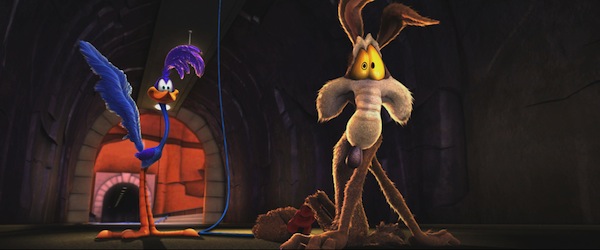
SK: There have been a number of examples in the past where I think people have tried to follow in Stalling’s footsteps and evoke his style but it generally seems to fall flat. It’s so difficult to maintain his energy and his explosiveness with each passing second. I remember when I first saw this short I really felt Stalling’s presence. I could hear him in the music. It’s a great amalgam of the past and present.
CL: Thank you. We really tried to do it. Like I said, there was an immense amount both in my own part and as well as Matt O’Hallahan, who directed it. We really had such an immense amount of respect for the way they did it before. I think both of us really wanted to not let anybody down and that’s what we wanted to do, have it feel like it was a step into a more modern era, but it was certainly not letting any of the things that made them great go by the wayside in the trip. That was the most important thing to us, I think.
SK: How difficult was this project? Did if feel like a feature, even though they were relatively short?
CL: Yeah, there was a lot of notes obviously as you can hear, but it definitely felt like a feature because we had a nice orchestra. We had recorded at Warner Brothers and we tried to do it the way they would have done it. Definitely we tried to make the actions seem very feature like. It was shorter, but we definitely spent more time on that small amount of music than I would have on two minutes of a feature certainly.
SK: And you signed on to do a total of three animated shorts?
CL: Yes.
SK: So was that the first one?
CL: The first one was before CATS AND DOGS 2 (2010) and the other two are actually done already. The next one comes out with THE LEGENDS OF THE GUARDIANS: THE OWLS OF GA’HOOLE (2010). The third one will come out with YOGI BEAR (2010).
It’s funny, they all ended up having their own musical joke smack dab in the middle of it. The first one had a big ballet waltz section in the middle of it as Coyote is swinging around. The second there’s another musical joke that I won’t give away and the third one, I won’t give away the joke, but there’s a huge Elmer Bernstein style western section in it. I’m really proud of that one because I ended up studying with Elmer when I went to USC and I had a huge sense that I wanted to make sure we got that style right too.
SK: Are they all Wiley E. Coyote shorts? Or do they feature other characters...
CL: Those three are all Wiley and rumor has it that we have been given the go-ahead to do another three next year. You can quote me that it’s a rumor…
[Both Laugh]
CL: ...and if we do do another set of three for the next three 3D feature releases, then I know for a fact that there will more of the old school characters besides just Wiley and Road Runner.
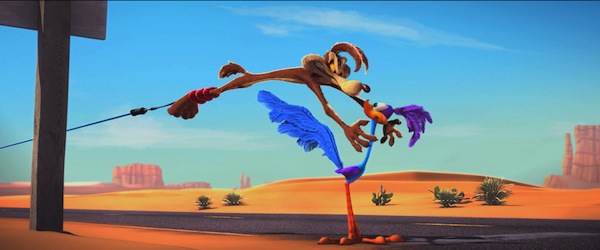
SK: That’d be a nice mix into your yearly schedule, just to do a few of these every year for a while.
CL: Oh that’d be great. That’d be so great, especially for me coming out of SUPERNATURAL. I’m also doing a big action game for Sony right now and then these comedy movies. It’d be nice to be able to do an animation thing every couple of months.
SK: Let’s switch gears a little bit and talk about some of the other movies that you have been doing. You have been extremely busy. It seems like it’s been a great year for you.
CL: It really has. I feel very lucky, because I know the economy is going down and luckily somehow or another I have managed to ride a way up. One thing I’ve been really serious about is I didn’t want to stop doing projects that interest me, no matter where they came from and I didn’t want to stop working with people that I love.
I wanted to make sure that I continued with SUPERNATURAL. First of all, because I love the show and the music. Second of all, I love the people involved in that show. I’ve continued to do video games as well. I did THE GODFATHER sequel game for EA last year which is a chance to flex some other musical muscles that I might not get a chance to flex as much in the feature world.
So for me to be able to keep doing that stuff while still ramping up to doing three or four features every year, it’s been a blessing. It’s been really great for somebody like me who equally and truly likes all different styles of music to be able to always have something different to write when I open the door to the studio every morning. That has been a total blessing.
SK: Your music and the projects you take on are very eclectic; however, most people would associate you with light comedies and family fare. I’m sure you could do a lot more of them if you chose to do that. At what point do you start worrying about being stereotyped or pigeonholed toward certain genres. How do you maintain diversity and still gravitate toward a particular genre which you excel at?
CL: It’s just one of those things. You never want to look a gift horse in the mouth. At a certain point you just love writing music in all those styles. You’re happy to be able to do it, but you’re totally right. I think at the end of the day, the people who know my game scores like GUN and METAL OF HONOR: WAR HAWK, those kind of things are probably the styles of music that I gravitate towards most. Obviously, I would love to start doing some features that had that sort of vibe as well. It’s a tough business. I’m constantly fighting that fight of everybody knowing me for doing the comedies and family films. You always have to be re-educating people. I’m always making sure that I say, “Hey, I’m glad you liked what I did on ALVIN AND THE CHIPMUNKS (2007), but have you listened to GUN yet?” (Laughs)
I can’t keep doing that, but I think also at a certain point now I’m going to be a little bit choosier. I wouldn’t say I’m going to stop doing family films, I would just say I’m probably going to limit them to working with the people that I really want to work with. That’s one of the things that I think about as I look toward composers’ careers who I really admire. Guys like Alan Silvestri who still does family films often but always makes sure that he mixes in things like...Hell, I would have never thought he would have done THE A-TEAM (2010) this summer. At that point he was probably like “Alright, well I’ve done two or three family things recently, I’m going to do an action movie.”
I think I pick my projects a lot like I pick my meals, “If I had Mexican for lunch, then I want Italian for dinner.” I may not do it specifically in film or video games or TV alone, but given all three of those I will certainly be much more likely after finishing a film like CATS AND DOGS. Chances are if somebody calls with a really intense horror video game, I will probably be more likely to say yes to that than another family film, just vary it up musically so my output always continues to be pretty eclectic. Ultimately I would love to be able to do some unusual things in the different genres, maybe I can do some action movies and then maybe I will end up doing some family Wii games so my daughter can play them.
[Both Laugh]
SK: It seems a little easier to do that in the present industry. Twenty to fifty years ago if you got pigeonholed, it was really hard to shake. There was a period in the 80s where Elmer Bernstein couldn’t score anything but a comedy.
CL: Exactly! The funny thing is, here’s the guy who was originally pigeonholed as a huge composer doing THE TEN COMMANDMENTS (1956). Then he got pigeonholed for doing westerns.
First of all, it’s kind of cool to be pigeonholed in multiple genres, but I think now there is a lot more cross-pollination. I think because you have family films that have more action, you have action films that have more comedy and maybe it’s just because TV looks more like movies now and video games look more like movies. Now people are getting a little more accustomed to seeing people jump around.
Obviously all of us were jumping up and down for joy when Michael Giacchino won the Oscar this year for a really great family film after he climbed up through the ranks doing first action video games and then action television and then moves on and ends up getting an Oscar for a really sweet family film. For those of us who are sort of working in those same trenches, it’s great to be able to see that you can succeed in all of those genres and rise up to that level. So I’m actually really encouraged as a composer now. I think you are completely right. I think a lot of the stereotypes have gone by the wayside and you are able to do more things and people aren’t quite as surprised.
SK: Let’s talk about CATS AND DOGS 2 a little bit. I have seen the film and I liked your music quite a bit. I brought my kids to see it and they were mesmerized. My two and a half year old, who’s a great movie watcher, I don’t think he moved a muscle the entire hour and a half.
CL: Mine too! I have a two and a half year old girl and she kept the glasses on the whole time and everything.
SK: Yeah, that was his first 3D movie. I was mesmerized watching him be mesmerized.
CL: Yeah, it was pretty crazy. I think it was a fun…Of course, all of us were hoping that it would have done better than maybe it has, but it’s really a cute little movie...well, it’s not little, it’s a cute big movie. [Both Laugh] We had a lot of fun with it because were were able to take a lot of the action sequences and do them in a really great “spy-movie” way using elements of John Barry and Lalo Schifrin and MISSION: IMPOSSIBLE (1966-1973). At the same time it gave the adults something to really get excited about.
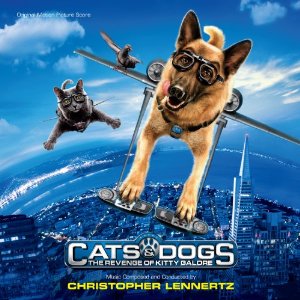
SK: I like the score that John Debney did for the first film. It didn’t seem like your score was an extension of Debney’s original score but rather that each score was an extension of the same composers you mentioned like John Barry and Lalo Schifrin.
CL: Absolutely. That’s really the reason, other than the story, that I got this movie. I think they looked at my credits and saw that I did ALVIN AND THE CHIPMUNKS and then they put on the CD for the James Bond video game FROM RUSSIA WITH LOVE that was a full on Sean Connery old-school James Bond kind of score. At that point they were sold, “Okay, this guy can do the family film comedies and he can do the spy movie homage.” It’s obvious that’s definitely where we came from, so my marching orders from Brad Peyton, the director, at the very beginning were “This should feel like a fun spy movie first, and a family film second. We definitely need the heart of the family film, but we want to make sure that the pacing is much more along the lines of a really great spy movie.”
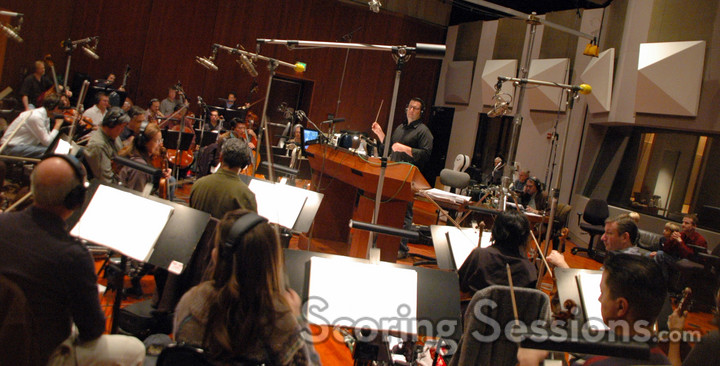
Chris Lennertz conducts CATS AND DOGS: THE REVENGE OF KITTY GALORE
(click to see more photos at ScoringSessions.com)
SK: How do you walk the line between paying homage to another composer’s style and still retaining your own voice? Do you view this score as a parody of another composer’s style? How much were you able to express yourself as the composer?
CL: I actually think I did more on this one than I have in some, because in some of the video games I have done like the JAMES BOND titles or THE GODFATHER titles we had to use the themes of those films. In a film like CATS AND DOGS 2, all of the themes were my themes and more than anything I would say it was the orchestration that was the homage.
I think the actual themes and the timings and that kind of stuff were very much the way I would score my own. if someone gave me a JAMES BOND movie, “This is how I would do it,” I was able to bring in all of my favorite stuff, everything from PINK PANTHER (1963) to BOURNE IDENTITY (2002) to BULLITT (1968) and use orchestrational elements to just highlight the style around the themes that I had written. That was a way to have my cake and eat it too.
SK: I want you to go back to the very beginning when you were first approaching this score. Usually there are goals and expectations you have for your music when you are starting out. What aspects of your score do you feel were the most successful in achieving these expectations and what aspects do you feel might have fallen short?
CL: Definitely the most successful aspect for me was the idea of creating a spy film with a lot of fun to it. I think that’s the one thing we wanted to do. One of the things that you didn’t get in this genre of family spy film, compared to what would have been in an old Sean Connery JAMES BOND movie, is you didn’t get quite get the level of darkness or evil, because obviously your audience is much younger and we don’t want to scare anybody.
Obviously there’s no sexy romance level. The one thing I think we got right was to take some of the space that was left available in terms of style and what we tried to add was fun and trying to get the kids in the audience to feel like your music was part of the experience. I think that was really successful. There’s a couple of really great action sequences, like when they are on the cruise ship. Things like that are really musical showcase moments, but also have that real element of fun. I thought that worked really well.
It terms of what didn’t work, I’m not sure anything didn’t work, the only thing that I would say that it’s really tough to do sometimes with these kinds of films, because a lot of time you don’t know what the actual final dialogue is going to be while you are writing, because you are writing for one line and you may end up in the mix seeing that they’ve actually stuck an entire sequence of three or four lines of jokes in there and at that point you have written music that is not either too busy and needs to get turned down to get out of the way of what used to be a throwaway line that’s now a big important joke. Or if maybe they have re-voiced the character and they’ve got a much lower voice and if you would have known that you would have written for a different instrument perhaps, but you didn’t even know because it came later. I think the hard part about doing these CGI animated films is that so much of it is last minute, so much of the voice recording and things like that are last minute, so the composer really doesn’t get the opportunity to be aware of what’s coming down the pike in those sections. That sometimes poses a little bit of a problem.
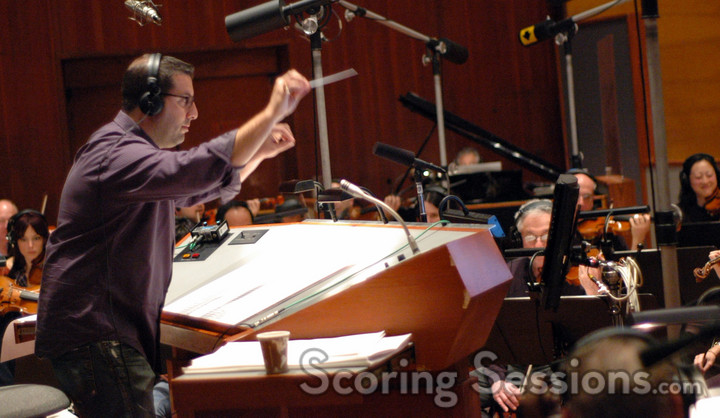
Chris Lennertz conducts CATS AND DOGS: THE REVENGE OF KITTY GALORE
(click to see more photos at ScoringSessions.com)
SK: Can you walk us through the basic catalog of themes that you wrote?
CL: Yep, Kitty Galore had a theme. There was a main theme for Diggs, which is the German Shepherd and that’s a little bit more of a heroic theme that blossoms towards the late part of the score. There’s also a heroic theme for what we call “Dog HQ,” which is the dog version of the CIA. Then there’s also a MEOWS theme, which is the cat underground intelligence agency. That one is full-on four or five alto flutes and finger snaps and very much in the world of sixties ketch.
I would say there’s a good five solid themes that come throughout the score that tie everything together and I think as the movie goes along, the hints of the heroic theme that you heard early on become much more full-blown. The last ten minutes of the movie is mostly that thematic material within a wrap-up that’s got everything else in there, but it definitely moved along those styles. I really think all of those themes we wrote really felt strong. We were having a good time with it.
SK: How was the collaborative process with the director, Brad Peyton? Was he active?
CL: It was pretty great. The only tough part was that we had quite a bit of time, because they were changing it into 3D and redoing stuff and so there were occasional thoughts not even from the director, but potential thoughts were the director and the studio didn’t always agree on our approach. I think my approach with Brad was really solid. I think we pretty much always had the same idea and part of the process was just convincing some of the people at the studio that Brad’s direction was really right and I think his instincts were great and it worked out really well in the end.

Chris Lennertz conducts CATS AND DOGS: THE REVENGE OF KITTY GALORE
(click to see more photos at ScoringSessions.com)
SK: So what projects do you have coming up?
CL: Well, we’ve got a sixth season of SUPERNATURAL starting up in about two weeks. I actually just finished a movie called VAMPIRES SUCK (2010) which comes out next week. It’s another parody film based on the TWILIGHT (2008) movies. As you can imagine that has a very grand sweeping tragic vampire love story theme to it. It’s actually one of my favorite themes that I’ve gotten the chance to write in the last couple of years, so I hope that one does well and people like it. After that I’ve got a movie called HOP (2011), which stars Russell Brand as the Easter Bunny. That’s probably all I can even say at this point, but it’s going to be a little bit edgier and a little bit crazier than some of the last animal kind of things.
SK: How do you work on these new film projects and SUPERNATURAL? Do they share concurrent schedules?
CL: They are concurrent. The great thing about SUPERNATURAL is that there are two composers on the show and we each switch off episodes, so we will do one week on and one week off and both of us have other things going on, so a lot of times if I know I’ve got two or three weeks of intense movie stuff, then we will actually just switch and he will do two or three in a row and then I’ll do two or three when I’m done. That’s been a really great situation to get through that and so every time things have gotten really busy on the feature front, I have been able to have him take a little bit of the load and then I make it up to him when he does some Broadway stuff. When he has to go to New York I pick up some of his episodes.
SK: Are there any soundtrack release dates coming up?
CL: It’s actually a great month for soundtracks for my stuff, because VAMPIRES SUCK hits theaters next week, so that comes out on the 18th and then the soundtrack for that comes out the following week. The same week is also the soundtrack release for CATS AND DOGS on Varese Sarabande and then the same week is also the soundtrack for SUPERNATURAL Seasons 1-5 on Water Tower, which is Warner Brothers Records.
SK: Oh, nice.
CL: So I’ve got three in one.
SK: Is that a one disk SUPERNATURAL?
CL: Yeah, it’s just a one disk, but it’s chockfull of stuff. I think there’s about 30 tracks and about 73 minutes, so that’s about as much as we could possibly fit on a one disk and then we are going to keep writing for the next year or two and maybe do another one.
SK: Well, it sounds like things are going really well for you. Keep up the great work and maybe we can talk again in the near future. Thanks for your time.
CL: Yeah, that would be great! Thank you.

I'd like to thank Chris for talking with me about his latest projects. I’d also like to thank Dan Goldwasser at ScoringSessions.com for the awesome-as-usual photographs and to Costa Communications for helping set up the interview. I’d also like to say thanks to Mike McCutchen for his transcription help.
Soundtracks for CATS AND DOGS: THE REVENGE OF KITTY GALORE, VAMPIRES SUCK, and SUPERNATURAL Seasons 1-5 are currently available on CD.
ScoreKeeper!!!






Chris Lennertz conducts CATS AND DOGS: THE REVENGE OF KITTY GALORE (click to see more photos at ScoringSessions.com)

Chris Lennertz conducts CATS AND DOGS: THE REVENGE OF KITTY GALORE (click to see more photos at ScoringSessions.com)

Chris Lennertz conducts CATS AND DOGS: THE REVENGE OF KITTY GALORE (click to see more photos at ScoringSessions.com)

